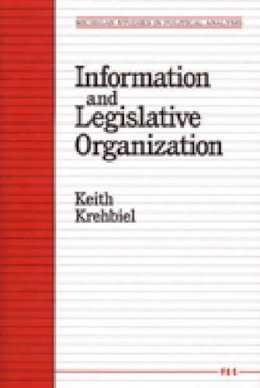
Information and Legislative Organization (Michigan Studies in Political Analysis)
Keith Krehbiel
In this controversial book, Keith Krehbiel investigates and casts doubt upon a view of Congress held by many academics, journalists, and members of the lay public: that Congress is organized primarily to facilitate logrolling or "gains from trade" between legislators. The author puts forward an alternative "informational" theory that, unlike previous formal theories, highlights institutional needs and individual incentives for acquiring policy expertise. Using games with incomplete information, Krehbiel derives a set of unique and testable predictions about the organization of legislatures -- including the composition of committees and the procedures under which legislation is considered.
Krehbiel's creative illustrations and nonmathematical presentation of formal theories make this book accessible to a diverse set of readers. The political relevance and testability of games with incomplete information will be appreciated by game theorists and economists, while the book's findings make it essential reading for political scientists who study American politics, political institutions, or democratic legislatures.
Product Details
Reviews for Information and Legislative Organization (Michigan Studies in Political Analysis)
American Political Science Review
". . . Krehbiel's analysis of special rules and post-floor procedures is among the best to date, superior in the quality of data and the sophistication of the analysis to the recent work of more strictly empirical scholars." —American Political Science Review
American Political Science Review
". . . adds an important new perspective to the theory of legislative institutions and provides the most comprehensive empirical assessment to date of alternative theoretical claims. Both theoretically and empirically, then, it offers excellent guidance for the next generation of scholarship." —American Political Science Review
American Political Science Review
